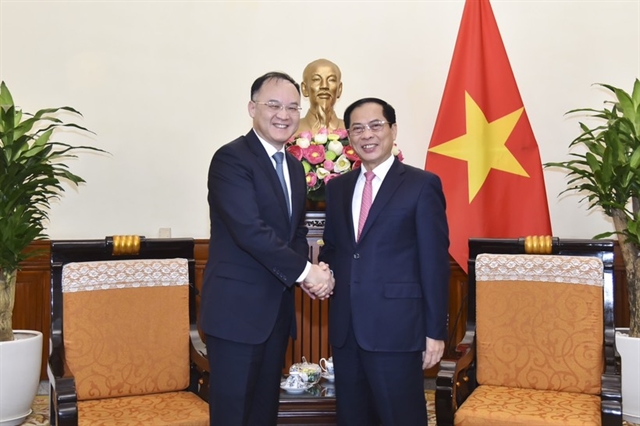 Politics & Law
Politics & Law


|
| Minister of Foreign Affairs Bùi Thanh Sơn (right) and Chinese Assistant Minister of Foreign Affairs Nong Rong. — Photo from the Ministry of Foreign Affairs |
HÀ NỘI — Minister of Foreign Affairs Bùi Thanh Sơn received Chinese Assistant Minister of Foreign Affairs Nong Rong, who is also Secretary General of the China-Việt Nam Steering Committee for Bilateral Cooperation, in Hà Nội on Monday.
The host expressed his delight at the sound development and historic achievements of the two countries’ relations since the visit to China by Party General Secretary Nguyễn Phú Trọng in late October 2022 and the trip to Việt Nam by Party General Secretary and President of China Xi Jinping in December 2023.
He emphasised the importance and practicality of bilateral coordination in implementing the high-level joint statements in a strong, effective, and substantive manner for the sake of businesses, localities, and people.
Welcoming Nong’s opinions and proposals on some orientations and measures for promoting bilateral ties, the Vietnamese minister recommended the two foreign ministries continue bringing into play their role as the standing bodies of the two countries’ steering committees for bilateral cooperation, and properly carry out the two foreign ministries’ agreement on further intensifying cooperation in the new period. He asked them to focus on properly organising exchanges and meetings at all levels in 2024, boosting the connection of development strategies, and stepping up result-oriented partnerships.
Sơn called on China to increase importing goods and farm produce from Việt Nam, coordinate to tackle problems of some joint projects, foster sustainable tourism cooperation, facilitate people-to-people exchanges and locality-to-locality ties, and maintain opinion sharing and coordination at multilateral mechanisms and forums.
For his part, Assistant Minister Nong said his working visit to Việt Nam aims for in-depth and comprehensive discussion between the two foreign ministries about measures, orientations, and tasks for enhancing bilateral relations in accordance with the common perceptions reached between the countries’ leaders.
Informing his host of the outcomes of his meeting with the Vietnamese Secretary General of the Việt Nam-China Steering Committee for Bilateral Cooperation Nguyễn Minh Vũ on February 4, Nong affirmed that China wishes and is ready to join Vietnamese agencies in maintaining opinion sharing, coordinating closely, and promoting high-level strategic discussion by properly arranging bilateral visits and meetings between the countries’ Party and State leaders.
China is also ready to enhance collaboration in such fields as diplomacy, defence, and security; and continue to reinforce result-oriented cooperation in different spheres, particularly the connection of development strategies, transport infrastructure, trade facilitation, people-to-people friendship exchanges, and locality-to-locality links, he added.
With regard to sea-related issues, both sides underscored the importance of seriously implementing the agreements and common perceptions on the better control and settlement of sea-related differences reached by senior leaders of the two Parties and the two countries, fully and effectively implementing the Declaration on the Conduct of Parties in the East Sea (internationally known as the South China Sea) (DOC), and promoting substantive progress in the negotiations on a code of conduct (COC) in the waters.
Minister Sơn asked the two sides to respect each other’s legitimate interests, in line with international law, especially the 1982 United Nations Convention on the Law of the Sea, to help maintain regional peace, stability, and development. — VNS




